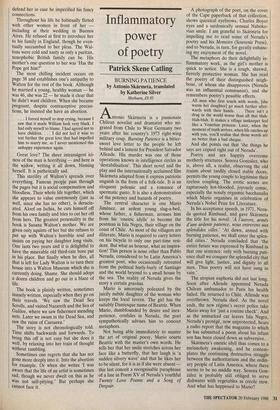Inflammatory power of poetry
Patrick Skene Catling
BURNING PATIENCE by Antonio Skarmeta, translated by Katherine Silver
Methuen, f9.95
Antonio Skarmeta is a passionate Chilean novelist and dramatist who mi- grated from Chile to West Germany two years after his country's 1973 right-wing military coup. Burning Patience is a bitter- sweet love letter to the people he left behind and a lament for President Salvador Allende. His murder was one of those operations known in intelligence circles as `destabilisation'. This short novel and the play and the internationally acclaimed film Skarmeta adapted from it express patriotic anguish in the form of a folk-tale. It is an eloquent polemic and a romance of spermatic gusto. It is also a demonstration of the potency and hazards of poetry.
The central character is one Mario Jimenez, an ardent young slug-a-bed, whose father, a fisherman, arouses him from his `oneiric idylls' to become the postman in Isla Negra, their village on the coast of Chile. As most of the villagers are illiterate, Mario is required to carry letters on his bicycle to only one part-time resi- dent. But what an honour, what an inspira- tion! This person is none other than Pablo Neruda, considered to be Latin America's greatest poet, who occasionally retreated from the political hurly-burly of Santiago and the world beyond to a small house by the sea. The reality of Neruda gives the story a certain gravitas.
Mario is amorously poleaxed by the juicily nubile daughter of the woman who keeps the local tavern. The girl has the suitably Dantesque name of Beatriz. When Mario, dumbfounded by desire and inex- perience, confides in Neruda, the poet sympathetically advises him to concoct metaphors.
Not being able immediately to master the art of original poesy, Mario courts Beatriz with the master's own words. He tells her that her smile stretches across her face like a butterfly, that her laugh is 'a sudden silvery wave' and that he likes her to be silent, for it is as if she were absent this last conceit a recognisable paraphrase of a line in Poem XV of Neruda's youthful Twenty Love Poems and a Song of Despair. A photograph of the poet, on the cover of the Cape paperback of that collection, shows quizzical eyebrows, Charles Boyer eyes and a sardonically sensual Naboko- vian smile. I am grateful to Skarmeta for impelling me to read some of Neruda's poetry and his Memoirs (Souvenir Press), and to Neruda, in turn, for greatly enhanc- ing my enjoyment of the novel.
The metaphors do their delightfully in- flammatory work, as the girl's mother is quick to notice. She is a tough, shrewd, fiercely protective woman. She has read the poetry of their distinguished neigh- bour, of whom she disapproves (Neruda was an influential communist), and she remembers poetry's possible effects.
All men who first touch with words, [she warns her daughter] go much further after- wards with their hands. . . . There isn't a drug in the world worse than all that blah- blah-blah. It makes a village innkeeper feel like a Venetian princess. Later, when the moment of truth arrives, when life catches up with you, you'll realise that those words are no better than a bad cheque.
And she points out that 'the things he says are copied right out of Neruda'.
Poetry and sex happily overcome motherly strictures. Senora Gonzalez, who is, above all, a realist, observing the old truism about tardily closed stable doors, permits the young couple to legitimise their tireless coupling. The erotic scenes are rapturously hot-blooded, joyously comic, especially the noisily orgasmic bacchanalia which Mario organises in celebration of Neruda's Nobel Prize for Literature.
In his acceptance speech, in 1971, Neru- da quoted Rimbaud, and gave Skarmeta the title for his novel: 'A I'aurore, arm& d'une ardente patience, nous entrerons aux splendides villes."At dawn, armed with burning patience, we shall enter the splen- did cities.' Neruda concluded that 'the entire future was expressed by Rimbaud in that one sentence: only with burning pati- ence shall we conquer the splendid city that will give light, justice, and dignity to all men. Thus poetry will not have sung in vain.'
The utopian euphoria did not last long. Soon after Allende appointed Neruda Chilean ambassador to Paris his health failed. He returned to Chile. Allende was overthrown. Neruda died. As the novel ends, the new regime's secret police take Mario away for 'just a routine check'. And as the unmarked car leaves Isla Negra, Neruda's protégé, now unprotected, hears a radio report that the magazine to which he has submitted a poem about his infant son has been closed down as subversive.
Skarmeta's oneiric idyll thus comes to a melancholy awakening, and he contem- plates the continuing destructive struggle between- the authoritarians and the ordin- ary people of Latin America, where there seems to be no middle way. Senora Gon- zalez is probably still obliged to serve dishwater with vegetables as creole stew. And what has happened to Mario?


















































 Previous page
Previous page